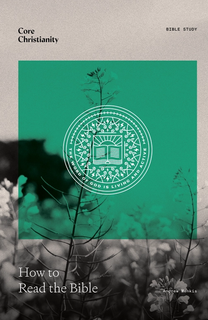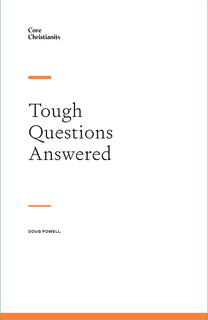The word Trinity never appears in the Bible. Has that ever worried you? If you believe that the Bible is God’s infallible word, maybe it has. The early Christians who created this term weren’t trying to smuggle their personal ideas into the Christian church. Instead, they used the term Trinity to describe the reality that Scripture revealed: that God is both one and three.
From the beginning, Christians were baptized into the names of the three persons of the Trinity. This is what Jesus had told his disciples to do: “Go therefore and make disciples of all nations, baptizing them in the name of the Father and of the Son and of the Holy Spirit, teaching them to observe all that I have commanded you” (Matt. 28:19–20).
The Nicene Creed of AD 325 affirmed and more clearly defined the Scriptural reality that the one God exists as three equal persons:
We believe in one God,
the Father, the Almighty…
We believe in one Lord, Jesus Christ,
the only son of God,
eternally begotten of the Father,
God from God, Light from Light,
true God from true God,
begotten, not made,
of one being with the Father…
We believe in the Holy Spirit, the Lord, the giver of life,
who proceeds from the Father [and the Son].
With the Father and the Son
he is worshipped and glorified.
For more than 1,600 years, the Christian church has affirmed these words as the truth about who God is, which God himself reveals to us in the Bible.
How Is God One?
Over the centuries, Greek philosophers had worked their way toward the idea of one supreme god. They believed this to be more rational than believing in the Olympian gods like Zeus and Poseidon, who acted as disgracefully as human beings.
These philosophers often disagreed, though, about the nature of this one god and his relationship with everything else. Was he the only god? Exactly how much power did he have? Was he actually distinct from the cosmos or was everything god?
Christianity, however, didn’t spill out of Greek philosophical wrangling. It began in Palestine, the region of the Roman Empire that had once been the nation of Israel, and the first Christians were all Jews. Their foundational belief about God’s nature came from Moses, recorded in Scripture more than a millennia before Jesus’ birth: “Hear, O Israel: The Lord our God, the Lord is one” (Deut. 6:4). Jesus quotes and affirms this statement (Mark 12:29), and the New Testament often refers to God as one (Rom. 3:30; Gal. 3:20; Eph. 4:6; 1 Tim. 2:5; 1 Cor. 8:4–6; James 2:19).
As worshipers of one God, the Jews had always stood apart. In the ancient Near East, Israel had been surrounded by nations that worshipped a multitude of gods. In the Roman Empire of Jesus’ day, the Jews were granted a special status, exempting them from the official religious rites of the state because of their monotheism—their unique belief in one God.
The early Christians, as Jews, fully embraced the one God who had revealed himself to Israel. Jesus, they believed, hadn’t started a new religion: he’d fulfilled the hopes of Israel. When the apostle Paul traveled around the Roman Empire preaching the gospel, he usually went to the Jewish synagogue first when he entered a new city. He’d argue from the Jewish Scriptures that Jesus was the Messiah. For example, in Thessalonica, Paul went to the synagogue and “reasoned with them from the Scriptures, explaining and proving that it was necessary for the Christ to suffer and to rise from the dead” (Acts 17:2–3).
The oneness of God was as foundational for Christians as it was for Jews.
How Is God Three Persons?
God isn’t one with his creation. He’s the Creator. He’s eternal, all-powerful, and free. He chose tocreate the world—it’s not part of him, nor does the world flow naturally out of him. He speaks it into being, out of nothing.
This is how the Bible introduces us to God: “In the beginning, God created the heavens and the earth” (Gen. 1:1).
The apostle John echoes these words at the beginning of his Gospel, but with a twist: “In the beginning was the Word, and the Word was with God, and the Word was God. He was in the beginning with God” (John 1:1). While Genesis 1:1 begins with action—God creating the universe—John focuses on who God is. Genesis shows God creating everything by speaking: “And God said, ‘Let there be light,’ and there was light” (Gen. 1:3); John explains that this Word of God is a person. John calls the Word “He.”
This person is with God (“The Word was with God”). He also is God (“The Word was God”). God is one, and yet the persons of the godhead are distinguished. John then affirms that this Word is the eternal Son of God, who became the Jewish human Jesus: “And the Word became flesh and dwelt among us, and we have seen his glory, glory as of the only Son from the Father, full of grace and truth” (John 1:14).
Jesus himself refers to his eternal fellowship with God the Father when he prays with his disciples the night before his death. He says, “And now, Father, glorify me in your own presence with the glory that I had with you before the world existed” (John 17:5). Elsewhere, he tells the Jewish leaders, “I and the Father are one” (John 10:30).
The creation story in Genesis introduces not only God and his Word but also the third person of the Trinity. As God prepares to give shape to what he’s created, “The Spirit of God was hovering over the face of the waters” (Gen. 1:2). In John, the Holy Spirit reveals himself to John the Baptist in order to identify Jesus as the Son of God. John says, “I myself did not know him, but he who sent me to baptize with water said to me, ‘He on whom you see the Spirit descend and remain, this is he who baptizes with the Holy Spirit’” (John 1:33). The Holy Spirit works in concert with the Father and the Word in both creation and redemption.
It’s the Holy Spirit that Jesus says God will send once Jesus has been raised from the dead (John16:7–11). Jesus refers to him as a person—he’s the Helper, and “he will convict the world concerning sin and righteousness and judgment” (John 16:7–8). He comes from God (John 14:6). He works in concert with the Father and the Son toward the same ends. The apostle Paul identifies the Holy Spirit directly with God: “For who knows a person’s thoughts except the spirit of that person, which is in him? So also no one comprehends the thoughts of God except the Spirit of God” (1 Cor. 2:11).
Is the Trinity Practical?
Do we need to know all this, though? As long as we know Jesus died for our sins, isn’t that enough?
Throughout history, various people have argued that the Trinity isn’t a practical doctrine. In reality, though, it’s what the Christian faith is all about. Jesus came to make God known to us (John 14:9), and he died to restore our relationship with God (1 Pet. 3:18). God saves us so that we can live with him and be his people forever (Rev. 21:3). How can this happen if we don’t even know who God is?
Even Jesus’ death for our sins can’t be understood without the Trinity. Jesus could only save us because he was truly God and truly man. If he was only a man or an angel or a demigod, he could not have endured God’s wrath in our place.
And it’s the Holy Spirit who united us to Jesus. The Holy Spirit awakens us from spiritual death through the gospel, creating saving faith in us.
In everything God does—in both creation and redemption—the three persons of the Trinity work together. If we’re Christians, our relationship isn’t with Jesus only, but with the Father, the Son, and the Holy Spirit. It’s to this one God who is three persons that we belong.
What Does the Bible Say?
- God is one: Deut. 6:4;Mark 12:29; Rom. 3:30; Gal. 3:20; Eph. 4:6; 1 Tim. 2:5;1 Cor. 8:4–6
- God is three: Matt. 28:19–20;John 1:1–3, 14, 32–34; 10:30; 17:5; Col. 1:15–17; 1 Cor. 2:11
Recommended Resources
- On the Incarnation, by Athanasius
- The Deep Things of God: How the Trinity Changes Everything, by Fred Sanders
- Communion with the Triune God, by John Owen
From Core Radio
Why It’s Important for Christians to Understand the Trinity
Was the Trinity Broken at the Cross?
Are Mormons True Christians if They Deny the Trinity?
From Core Christianity
Why Does the Trinity Matter?
How Do I Explain the Trinity to My Kids?
What Is the Trinity? {Lord’s Day 8}




